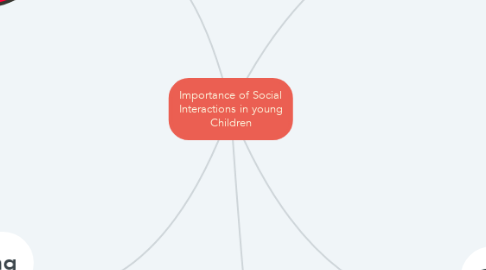Importance of Social Interactions in young Children
by Earlnil ray Acanto

1. Preschool aged children who develop positive peer relationships tend to maintain positive peer interactions throughout grade school. Whereas, preschool aged children who do no form positive peer relationships tend to struggle academically as well as face rejection and neglect from their peers throughout their grade school years.
2. Scaffolding
2.1. Through scaffolding, the adult can provide the child with gentile feedback, positive interaction, modifying the environment and facilitate learning. If the child is hesitant about joining his or her peers, the adult can give suggestions and a comforting guide to help the child engage in play
3. Scaffolding helps children learn proper social skills through parent or teacher modeling and assistance. It teaches the child the skills needed for proper development within social interactions. "Scaffolding involves offering suggestions, giving gentle feedback, and modifying the environment to facilitate learning opportunities".
4. Parents and Teachers Roles
4.1. Parents may often wonder what they can do to help their children learn proper social interactions but they may not have the knowledge needed to help their child work through any developmental hurdle their child may face.
4.2. When the parents and teachers work together, they are able to provide the child with necessary tools needed to help them grow and develop.
5. Communication
5.1. Communication will not only help children become more comfortable talking to their parents about everyday situations, it will allow the parent to assist when needed. If the parent is not aware of any issues the child may face at school, they are not able to help. It is also been noted that "Children who have more frequent conversations with a parent about peer relationships are better liked by other children in their classrooms and are rated by teachers as more socially competent.
6. Opportunities
6.1. A child cannot learn to develop relationships with their peers if they are not given the opportunity to do so. By providing children the opportunity to form valuable peer relationships, the child is able to learn at an early age and valuable social interactions as well.
7. Talking to children on a daily basis will help the child become more comfortable communicating about events that occur through out his or her day at preschool and the things that happens with their peers. Communication needs to be enjoyable for both the parent and child. Communication will show the child that the parent is interested in their well being and also allows the parent to help the child with any problem solving or social skills advice or tips.
8. At the age of one, children begin to reach the important social milestones of smiling, vocalizing and reaching for peers. This is the start of their social activity. Giving your child the chance to form relationships with other children and adults will provide ample of opportunities for your child to grow socially


